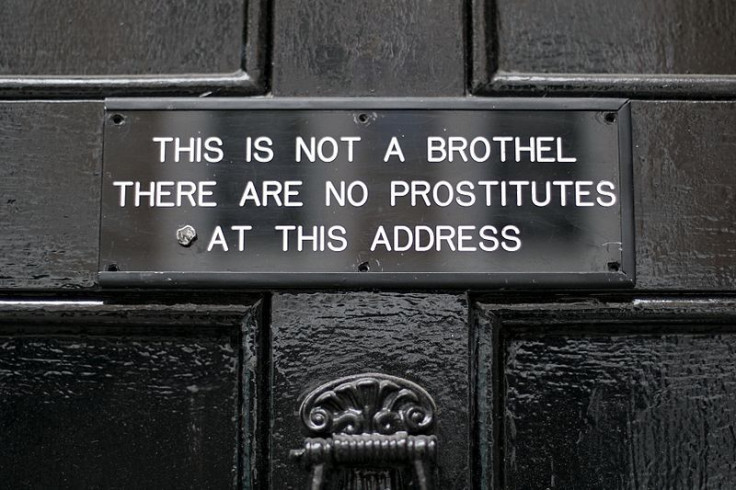Despite Legalization, Prostitutes In Germany Face Exploitation And Trafficking; Laws Intended To Improve Conditions May Actually Help Brothels

The problem of human trafficking within Germany's prostitution industry is growing, and despite its legalization over a decade ago, prostitutes are working in worse conditions for less money.
The health conditions facing the industry right now are so troubled, mostly because of the influx of foreign, often trafficked, prostitutes, coupled with market competition depressing wages. Together, these factors make for a legalized industry whose carpet-level prices only engender more problems, both economically and personally.
Approximately 3,000 brothels populate Germany, with Berlin accounting for 500 of those alone. Working in these brothels are 200,000 prostitutes who collectively serve over a million men every day. Market saturation has led to a climate where sex acts that normally cost $54 now cost $13, with one woman saying she would do it just for a Big Mac. A brothel by Schönefeld airport in Berlin once offered unlimited sex, however the customer wanted it, for a flat rate of $129.
At the heart of Germany's prostitution problem is the question of who, exactly, benefited the most from prostitution becoming legalized back in 2001: was it the prostitutes, or the brothels who employed them?
The current brothel system in Germany provides few benefits for its female workers, who are increasingly coming to the country from Romania and Bulgaria ever since the two countries joined the European Union. Typically, women come to work at a brothel under the promise of financial freedom, or get hoodwinked by a man preying upon love-struck Cinderellas, according to Sina, a prostitute from Moldova. Holger Rettig, who works at the Erotik Gewerbe Deutschland (German Employers' Association of Erotic Companies, UEGD), said this migration has led to a drop in prices. He notes this drop is characterized by "a radical market economy rather than a social market economy."
Although the law states prostitutes should sign a formal contract stating their employment, only about one percent ever do so — one formality out of many that go unchecked.
German brothels rarely enforce their system of regulations, if they have them at all. Women often stay at the brothel around the clock, especially if they live in the country illegally, according to a former prostitute who used the pseudonym Doris Winter. In a contribution to the academic series "The Prostitution Law," Winter noted that "the women usually live in the rooms where they work." Brothels charge for these rooms on a daily rate — a fee that sits on top of a host of other subtractions from the woman's overall wage earnings.
Meanwhile, brothel owners enjoy free rein to treat their prostitutes however they choose, given that the legalization has given the brothels greater credibility, and so police raids no longer pose a great threat. As reported by Der Spiegel back in May, "In a poll conducted by Ver.di, a brothel operator said that she valued the prostitution law because it reduced the likelihood of raids. In fact, she said, the law was more advantageous for brothel operators than prostitutes."
For the women like Sina, who have left their home countries, human trafficking does not well represent their plight. Many women would prefer their status making money than risk putting their family in jeopardy. According to a prostitute quoted in Der Spiegel, very few of the women are ever beaten. But it's not because their employers are benevolent; rather, "They said that they knew enough people in Romania who knew where our families lived. That was enough," says Alina, a prostitute in Germany who left Romania when she was 22 under the promise of $1,170 a week.
"When she occasionally called her mother on her mobile phone, she would lie and tell her how nice it was in Germany," Der Spiegel reports. "A pimp once paid Alina €600, and she managed to send the money to her family."
Many of the brothel owners have working relations with the German police, the article says, so the industry operates under an ongoing fiction. Crimes and mistreatment are passed along under the guise of employment opportunities and safety. Brothel owners know when police raids will occur, the very reason Alina says she feared going to the police for help.
Now 11 years since prostitution was legalized in Germany, parties in the German government are rallying for reform, particularly in reference to the custom of flat-rate services. Thekla Walker, the Green Party chair in her home state of Stuttgart, introduced a motion last month regarding regulating prostitution.
"The autonomous prostitute we envisioned when the prostitution law was enacted in 2001, who negotiates on equal terms with her client and can support herself with her income, is the exception," the motion reads. Prostitutes' only freedom now is "merely the freedom to allow themselves to be exploited." The motion continued, saying the Greens cannot turn a blind eye to the "catastrophic living and working conditions of many prostitutes."
Walker eventually withdrew her motion, as she saw no hope for a majority vote and said that she doesn't believe "politicians have much interest in the subject." Her greatest tool is awareness, as she believes the government's indifference puts the onus on women to fend for themselves, at least until conditions improve.
And some indications point to those changes happening, such as the brothel by Schönefeld airport, which has since closed. In a testament to the country's resilience to protect the industry, however, it has been replaced by another brothel — Club Erotica — which does not offer flat rates but sits only a few miles away from another brothel, King George, that recently made the switch to offering them.
"For €99, clients can enjoy sex and drinks until the establishment closes. Anal sex, unprotected oral sex and kissing-with-tongue are extra. The King George offers a 'gang-bang party' on Mondays, Wednesdays and Fridays," writes Der Spiegel.
And as the story also notes, "It's completely legal."
Published by Medicaldaily.com



























